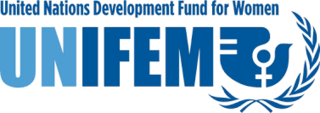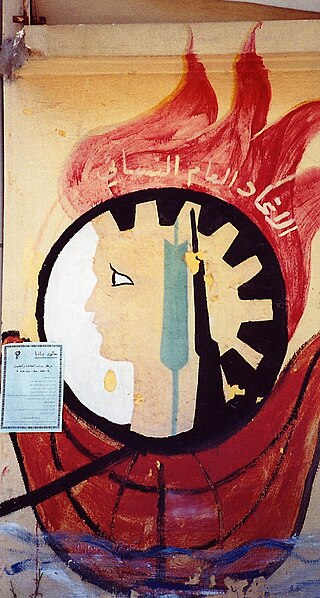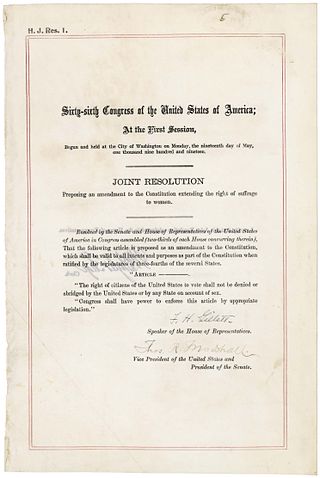
Bella Abzug, nicknamed "Battling Bella", was an American lawyer, politician, social activist, and a leader in the women's movement. In 1971, Abzug joined other leading feminists such as Gloria Steinem, Shirley Chisholm, and Betty Friedan to found the National Women's Political Caucus. She was a leading figure in what came to be known as ecofeminism.

In the United Nations, the Millennium Development Goals (MDGs) were eight international development goals for the year 2015 created following the Millennium Summit, following the adoption of the United Nations Millennium Declaration. These were based on the OECD DAC International Development Goals agreed by Development Ministers in the "Shaping the 21st Century Strategy". The Sustainable Development Goals (SDGs) succeeded the MDGs in 2016.
Gender equality, also known as sexual equality or equality of the sexes, is the state of equal ease of access to resources and opportunities regardless of gender, including economic participation and decision-making, and the state of valuing different behaviors, aspirations, and needs equally, also regardless of gender.

The United Nations Development Fund for Women was established in December 1976 originally as the Voluntary Fund for the United Nations Decade for Women in the International Women's Year. Its first director was Margaret C. Snyder. UNIFEM provided financial and technical assistance to innovative programmes and strategies that promoted women's human rights, political participation and economic security. Since 1976 it supported women's empowerment and gender equality through its programme offices and links with women's organizations in the major regions of the world. Its work on gender responsive budgets began in 1996 in Southern Africa and expanded to include East Africa, Southeast Asia, South Asia, Central America and the Andean region. It worked to increase awareness throughout the UN system of gender responsive budgets as a tool to strengthen economic governance in all countries. In 2011, UNIFEM merged with some other smaller entities to become UN Women.

Charlotte Anne Bunch is an American feminist author and organizer in women's rights and human rights movements. Bunch is currently the founding director and senior scholar at the Center for Women's Global Leadership at Rutgers University in New Brunswick, New Jersey. She is also a distinguished professor in the Department of Women's and Gender Studies at Rutgers.

The Commission on the Status of Women is a functional commission of the United Nations Economic and Social Council (ECOSOC), one of the principal organs of the United Nations. CSW has been described as the UN organ promoting gender equality and the empowerment of women. Every year, representatives of member states gather at United Nations Headquarters in New York to evaluate progress on gender equality, identify challenges, set global standards and formulate concrete policies to promote gender equality and advancement of women worldwide. In April 2017, ECOSOC elected 13 new members to CSW for a four-year term 2018–2022. One of the new members is Saudi Arabia, which has been criticised for its treatment of women.

The Fourth World Conference on Women: Action for Equality, Development and Peace was the name given for a conference convened by the United Nations during 4–15 September 1995 in Beijing, China.
Gender mainstreaming is the public policy concept of assessing the implications for people of different genders of a planned policy action, including legislation and programmes.

The General Union of Syrian Women (GUSW) was founded in 1967 with Saud al Abdallah serving as the original president. It aimed to mobilize women while developing their education, political activism, and skills that helped women become more effective members in socio-economic settings. While Syrian women have historically held more rights when compared to the rest of the Arab world, the GUSW is working to put an end the isolation and marginalization of Syrian women as well as involve women to become more of an effective population in society. This movement was born out of the unification of various welfare associations, volunteer organizations, and welfare groups caused by various political shifts in Syria.

Kamala Lopez is an American filmmaker, actress, writer, director, and political activist. She has had starring roles in Black Jesus, Medium, 24, Alias, NYPD Blue, Hill Street Blues, Miami Vice, and 21 Jump Street. She has been a featured actress in films including Born in East L.A., Deep Cover, The Burning Season, Clear and Present Danger, Lightning Jack, and I Heart Huckabees.

The National Organization for Women (NOW) is an American feminist organization. Founded in 1966, it is legally a 501(c)(4) social welfare organization. The organization consists of 550 chapters in all 50 U.S. states and in Washington, D.C. It is the largest feminist organization in the United States with around 500,000 members. NOW is regarded as one of the main liberal feminist organizations in the US, and primarily lobbies for gender equality within the existing political system. NOW campaigns for constitutional equality, economic justice, reproductive rights, LGBTQIA+ rights and racial justice, and against violence against women.

Women in Kazakhstan are women who live in or are from Kazakhstan. Their position in society has been and is influenced by a variety of factors, including local traditions and customs, decades of Soviet regime, rapid social and economic changes and instability after independence, and new emerging Western values.
According to Human Rights Watch, there is substantial discrimination against women in the United Arab Emirates. The status of women has improved over the years. UAE performs better on metrics of gender equality than many other states in the Gulf region, and it has been making reforms to protect women's rights and empower women in different sectors. Critics describe some of these reforms as window dressing.
The Declaration on the Elimination of Discrimination against Women is a human rights proclamation issued by the United Nations General Assembly, outlining that body's views on women's rights. It was adopted by the General Assembly on 7 November 1967. The Declaration was an important precursor to the legally binding 1979 Convention on the Elimination of All Forms of Discrimination Against Women (CEDAW). Its aim was to promote gender equality, specifically for protection of the rights of women. It was drafted by the Commission on the Status of Women in 1967. To implement the principles of the declaration, CEDAW was formed and enforced on 3 December 1981.

Women's Equality Day is celebrated in the United States on August 26 to commemorate the 1920 adoption of the Nineteenth Amendment to the United States Constitution, which prohibits the states and the federal government from denying the right to vote to citizens of the United States on the basis of sex. It was first celebrated in 1971, designated by Congress in 1973, and is proclaimed each year by the United States President.

The Women's Strike for Equality was a strike which took place in the United States on August 26, 1970. It celebrated the 50th anniversary of the passing of the Nineteenth Amendment, which effectively gave American women the right to vote. The rally was sponsored by the National Organization for Women (NOW). Estimates ranged as high as 50,000 women at the protest in New York City and more protested throughout the country. At this time, the gathering was the largest on behalf of women in the United States. The strike, spearheaded by Betty Friedan, self-stated three primary goals: free abortion on demand, equal opportunity in the workforce, and free childcare. The strike also advocated for other second wave feminist goals more generally, such as political rights for women, and social equality in relationships such as marriage.
The legal status of polygamy varies widely around the world. Polygyny is legal in 58 out of nearly 200 sovereign states, the vast majority of them being Muslim-majority countries. Some countries that permit polygamy have restrictions, such as requiring the first wife to give her consent.
The United Nations Entity for Gender Equality and the Empowerment of Women, also known as UN Women, is a United Nations entity charged with working for gender equality and the empowerment of women. UN Women is charged with advocating for the rights of women and girls, and focusing on a number of issues, including violence against women and violence against LGBT people.

Women's empowerment may be defined in several method, including accepting women's viewpoints, making an effort to seek them and raising the status of women through education, awareness, literacy, equal status in society, better livelihood and training. Women's empowerment equips and allows women to make life-determining decisions through the different societal problems. They may have the opportunity to re-define gender roles or other such roles, which allow them more freedom to pursue desired goals.

Vibha Bakshi is an Indian filmmaker, journalist, and founder of Responsible Films. She is known for her films that highlight issues of gender inequality. Vibha's most notable films as both director and producer include Daughters of Mother India and Son Rise. Both films are winners of the National Film Awards from the President of India. She is the recipient of four National Film Awards from the President of India.














